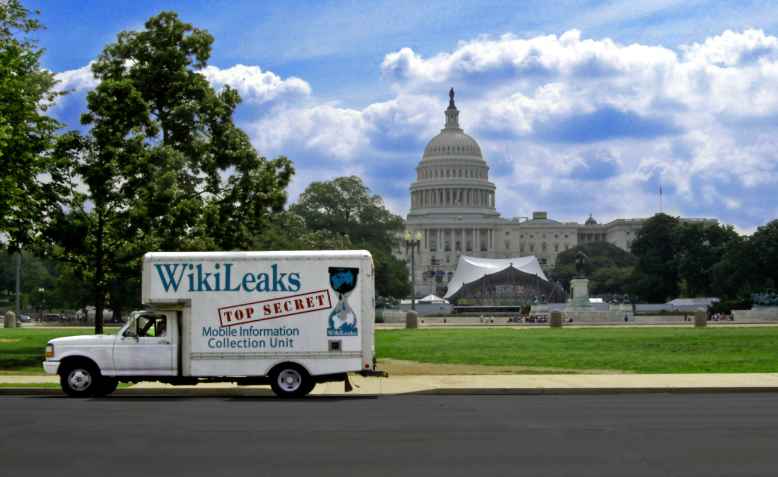 Wikileaks truck on Capitol Hill. Photo: wikimedia commons
Wikileaks truck on Capitol Hill. Photo: wikimedia commons
The arrest of Julian Assange today sets a dangerous precedent, argues Hilary Stephenson
Nearly seven years after the Wikileaks founder first claimed asylum at the Ecuadorian Embassy in London, Julian Assange was arrested today.
His central claim throughout the whole period was that he feared he would be extradited to the United States. It was always a credible claim. A US grand jury began meeting in 2010 to consider prosecution evidence after Wikileaks first revealed cables that bore witness to shocking US war crimes in Iraq. Another US jury gathered in 2011 to explore the evidence for violations of the Espionage Act.
But the response to Assange’s justified fears by much of the media and political establishment was demonisation and mockery. Even today the judge at Southwark Crown Court, where the first hearing took place after Assange’s arrest this morning, branded him ‘narcissistic’. The media has for years dismissed him as paranoid, delusional; a self-publicist gone awol.
But Assange’s arrest today has vindicated his worst fears. Shortly after he was handcuffed by the Met, Scotland Yard confirmed he had been “further arrested on behalf of the United States authorities” based on an “extradition warrant”.
At the moment we’re not certain where this will end up, but if this does lead to Assange’s extradition and prosecution in a US court – which now seems quite likely – this will have profound implications for us all.
As Ben Wizner, from the American Civil Liberties Union, said earlier “Any prosecution by the United States of Mr. Assange for Wikileaks’ publishing operations would be unprecedented and unconstitutional, and would open the door to criminal investigations of other news organizations. Moreover, prosecuting a foreign publisher for violating U.S. secrecy laws would set an especially dangerous precedent for U.S. journalists, who routinely violate foreign secrecy laws to deliver information vital to the public’s interest.”
Wikileaks has shone a light on some of the worst excesses of US imperialism – who can forget the video footage from a helicopter of US soldiers shooting and killing innocent Iraqi civilians below. The thousands of classified images and documents it published exposed in shocking detail the war crimes carried out by the US state abroad.
The liberal press that once lorded over Assange, quickly turned their backs on him as establishment pressures mounted. John Pilger got to the heart of the reason: “Assange refused to be a member of the club […] he showed that the media is really, and probably always has been, never more so than now, an appendage of established power. He shone a light on that and that was unforgivable.”
But Assange’s dismissal – and his arrest today – could soon come back to haunt the liberal media. After all, it was the Guardian, Der Spiegel and New York Times that co-published the leaks with Wikileaks. What’s to stop the authorities coming after them once Assange is prosecuted? What will stop the authorities coming after any of us?
When Assange faced allegations of rape and sexual assault in Sweden – which never led to a charge as the investigation was dropped and is only now being reconsidered – why didn’t the authorities facilitate justice by guaranteeing that he would not face extradition to the United States? That would have avoided the embassy debacle and seen Assange face the allegations in a timely manner. Instead, the Swedish authorities seemed to play political football with very serious allegations, rather than seeking justice for all parties.
The arrest of Julian Assange has much wider implications than for him as an individual. His arrest is a worrying development because it represents an attack on the rights of journalists. What’s at stake here is the principle that we have the right to speak truth power and not face arrest when we do so. That principle is in perilous danger today

